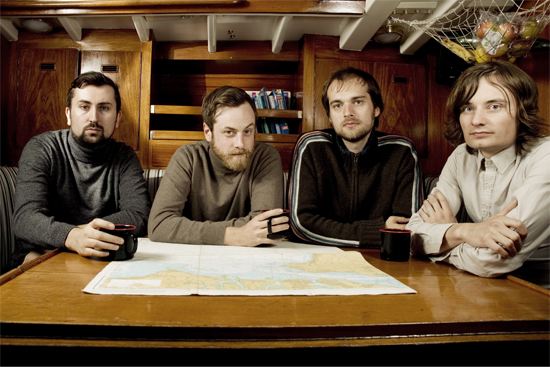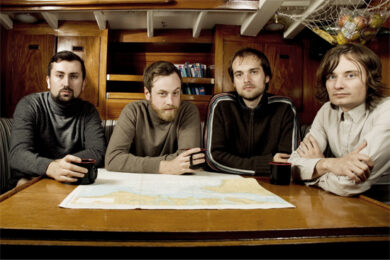It’s not every day when, during an interview, you can look up and see a hermit crab slowly extend a claw from out of its shell to deliver a hearty punch to an inquisitive fish. But then again, I Like Trains (now thankfully spelled with letters separate) are not quite any other band. The Quietus caught up with the Leeds-based group at their gig amidst the fish tanks of The Deep, a giant submarium perched on the banks of the River Humber in Hull. They were there to launch new, self-financed LP He Who Saw The Deep, a record that adopts a thoughtful musical atmosphere to explore a world where humanity has brought about its own demise thanks to rising sea levels and climate change. For some reason, their last LP Elegies To Lessons Learnt seemed to put some off with its narrative of the doomed, the desperate, and the dead. The Quietus, being made of sterner stuff, was moved to tears during a live performance of ‘We All Fall Down’, where the names of the plague dead in the Derbyshire village of Eyam rose up a screen behind the band as they played. Perhaps I Like Trains are too smart for most, or too interested in realism and fate when so many are content to indulge in for washy escapism. No matter, for like Noah I Like Trains smell the wind and know the waters are rising; He Who Saw The Deep makes for a mighty ark.
What has been the biggest obstacle to putting on a concert in a submarium?
David Martin: The sound, and the welfare of the fish. We were a bit worried that if we were playing too loud and really bassy there’d be some issues. They said that straight away, and we were aware that would be the case. We came to do a sound test to check on the welfare of the fish. Apparently the frogs and eels are the most sensitive to bass. You never see frogs and eels in clubs for that reason.
Alistair Bowiss: They did come and peer at us through the glass, but we didn’t get much more of a reaction…
Simon Fogal: bit like playing to a London crowd really.
The Quietus will have it known that after a few pints of wine we were most exuberant at your last London show. How has the process of going it alone been? As surreal as playing a gig in a submarium?
DM: It’s been a long slog. It’s been difficult at times, band the big relief was when the pledge went live and we got the funding to do it in 24 hours. We’d been away for three years between albums, and to know that people cared about us enough to put their money in and make it happen was great. Until you do something like this you never really know how much people care.
He Who Saw The Deep has a very different sound, what inspired the change?
DM: We knew we had to change, but we didn’t really know how we were going to do it. We had some ideas at the beginning of the process but we didn’t know where we’d be at the end. We never had a grand scheme that this is how it was going to end up.
Did you have the idea that you wanted to get away from preconceptions of all the songs being about history?
DM: I guess we challenged ourselves first and foremost to stay out of our comfort zone and be creative. At the same time there’s always in the back of our minds what is the perception of us, how far can we push that and still be us.
There’s still a lot of death, mind
AB: Yes, but we didn’t want it to be Elegies part two.
What of the watery imagery?
DM: We’ve done history-inspired albums up until now. We wanted to change, and the obvious progression from that was to look into the future. The overriding theme is that the human race will inevitably end up in a watery grave, so that’s what runs through it.
‘Progress Is A Snake’ struck me as a song about climate change
DM: Throughout the entire record there are strands of that. One of the criticisms that could easily have been levelled at us before on the history songs is that we laid all our cards out on the table. This is what we’re about. It was very straightforward and matter of fact, people couldn’t really use their imaginations. So I’ve tried to be a little more cryptic in the lyrics so people can make their own decisions about what individual songs and words refer too.
It still very much is able to create a world though. You’ve always had that strong identity and coherent aesthetic
DM: I’ve only realised since talking about the record with people that there’s an air of resignation as well, not trying to fight what it is. I’ve stressed that I don’t want to be preaching to people, it’s just how it is from what I’ve found from my reading.
Did the album involve a lot of research?
DM: Yes, just as much as on the history records. I was reading about the science of climate change. That’s what fuelled it. I find that the lyrics don’t really come unless I have input, so the research is really important. I was reading science journals and writing by James Lovelock was what really inspired me.
How about the title?
DM: It’s from Gilgamesh, a Mesopotamian text. This is old habits dying hard, I suppose, but I was doing research into Noah’s Ark. All great religions have a story of a flood, and it turns out this was the very first instance of it, this story of a great flood that wiped out lots of bad people. That’s where I see us heading, so that’s where I took the title from. It’s one of the first great pieces of literature, and its written on stone tablets. It’s about this guy and his quest to become immortal, which is how I think the human race sees itself.
If there is a watery apocalypse and you’re still around for it, what are you going to do to survive?
AB: Make like Kevin Costner and get a solar powered boat.
You mention an air of resignation, but there’s also been a tone to your music that’s very accepting of the human condition, and the idea of fate.
DM: I think it has something to do with being British, and this British outlook of ‘this is how it is’.
That’s not depressing is it? People mistake you as depressing and dour.
DM: I think when people know us they realise that we’re not depressing. I think there should always be a good slice of gallows humour.
You are such a British group, do people get it when you’re abroad?
DM: In Germany and Belgium they actually get it more than the Brits.
Do you feel that the British often don’t like to explore our own identity, we’d rather just surrender to and become more like Americans?
DM: Which I’m quite vigourously against. We’ve never really made it in America, for that reason.
You’ll have the last laugh in New York with a record about what happens when sea levels rise…
DM: I was doing an interview with a Dutch guy the other day and he was asking if we’d play ‘Progress Is A Snake’ at our show in Amsterdam. I said ‘yes, absolutely, it’s the perfect place to play it’. And Hull as well, it’s very low-lying around here…
I Like Trains new album He Who Saw The Deep is out now. They are currently touring the UK, for full dates visit their mySpace



